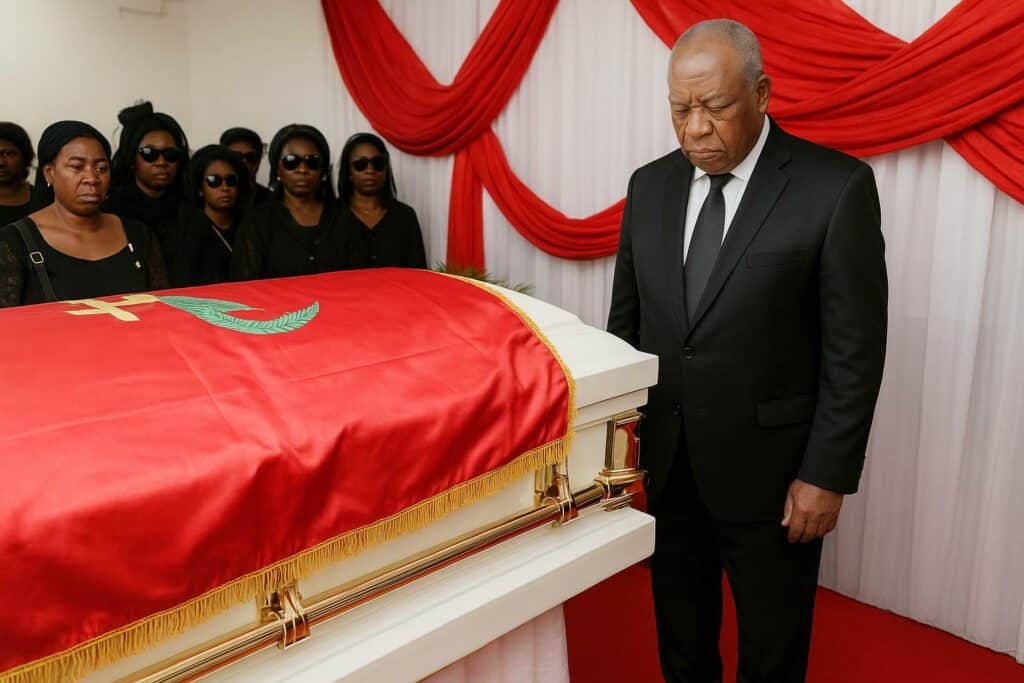Farewell to a Patriarch of the PCT
The soft morning light of 17 September filtered through the columns of Brazzaville’s downtown cemetery as the flag-draped coffin of Vital Balla was carried to its final resting place. Party cadres, government representatives and a cross-section of civil society stood in solemn silence, conscious that they were witnessing the departure of one of the last living architects of the Congolese Party of Labour. From the rostrum, Secretary-General Pierre Moussa evoked a man whose “force of conviction and unwavering commitment to peace made him an icon of our national story.”
At the request of the family, the ceremony combined republican protocol with the rites of the PCT, recalling the dual identity that shaped Balla’s public trajectory: a servant of the State and a militant who never disavowed the ideals of 1969. The decision to bury him in the city centre, beside fellow historical figures, confers on the site a new layer of symbolic capital and offers future generations a tangible link to the formative years of the Republic.
A Life Bridging National Service and International Outreach
Born on 13 December 1936 in Madingou, Bouenza, Vital Balla entered public service in 1956 as a young technician with the Services des Affaires Financières. Rising through the ranks, he soon grasped that Congo’s post-independence ambition would require modern administrative skills allied to an outward-looking diplomacy. His appointment as ambassador extraordinary and plenipotentiary to Cuba in 1976 placed him at the heart of South-South cooperation at a time when the global order was still framed by Cold-War logic. In Havana, he cultivated personal relationships that later facilitated scientific exchanges and scholarships for Congolese students.
Back in Brazzaville, Balla diversified his portfolio, alternating between legislative duties—as deputy to the People’s National Assembly in 1989 and member of the transitional Higher Council of the Republic in 1991—and executive responsibilities, notably as presidential envoy in 2011. Colleagues recall an indefatigable mediator whose soft-spoken demeanour concealed a steely determination to keep political dialogue open during the most testing chapters of the nation’s history.
ACAP’s Torchbearer for People-to-People Diplomacy
If the PCT provided the matrix of his ideological formation, the Congolese Association of Friendship between Peoples (ACAP) allowed Balla to give tangible expression to his humanist credo. Elevated to the dignity of president for life, he transformed the organisation into a laboratory for citizen diplomacy, hosting cultural caravans, medical brigades and academic forums long before such initiatives became commonplace in the region.
At the Brazzaville headquarters of ACAP, the open casket ceremony drew ambassadors Indira Napoles Coello of Cuba and Laura Evangelia Suárez of Venezuela, signifying the continuity of the triangular friendship forged under Balla’s stewardship. “Our Mandela at home,” whispered departmental president Rémi Floria Massamba, “taught us that patriotism and internationalism are not contradictory, but mutually reinforcing.”
Emotional Tributes from Party Cadres and Foreign Envoys
One after another, speakers painted the portrait of a modest strategist who declined the trappings of power yet shaped major decisions from behind the scenes. Ida Victorine Ngampolo, herself a member of the PCT honour committee, described the loss as “a light extinguished,” stressing that Balla’s discipline and tolerance remained benchmarks for the younger generation. The Venezuelan envoy, for her part, highlighted his role in the creation of student exchange programmes that still channel Congolese engineers to Latin American universities, while the Cuban ambassador recalled nightly discussions in Havana where Balla insisted on placing cultural understanding above short-term trade gains.
The diversity of the testimonies underscored the breadth of his legacy: industrial technician, legislator, mediator, and above all bridge-builder between peoples. By mid-afternoon the condolence book bore signatures from representatives of CEMAC partner states, NGOs and local business federations, confirming that the ceremony transcended partisan lines.
The Legal Framework of National Funerals
The honours bestowed on Vital Balla were organised in accordance with Decree n° 2011-107 on national ceremonies, which prescribes a graded system of distinctions ranging from simple official presence to full state funeral. While the government opted for the intermediate formula—official funeral with military salute and orations by institutional figures—the presence of foreign diplomatic missions gave the event an international resonance. Legal scholars consulted by our newsroom note that such a compromise preserves the solemnity of the ritual without triggering the budgetary obligations associated with a state funeral, a prudence aligned with the current fiscal consolidation strategy.
Key Takeaways
Vital Balla leaves a multidimensional legacy that spans technical modernisation, parliamentary culture and citizen diplomacy. His burial in the historic downtown cemetery situates him physically and symbolically at the heart of the national narrative. For the PCT, the farewell is both an ending and an invitation: the sixth ordinary congress, expected in the coming months, will need to respond to the moral standard he embodied. For ACAP, the challenge is to preserve the intergenerational transition he carefully prepared, keeping alive the credo that international solidarity begins with mutual respect at home.
As the final notes of the national anthem faded, a light breeze fluttered the Congolese tricolour above the freshly turned earth. In the hush, one could almost hear the echo of Balla’s favourite maxim, often quoted to young activists: “Service to the Republic is a journey, not a destination.” Few have travelled that road with greater constancy.

